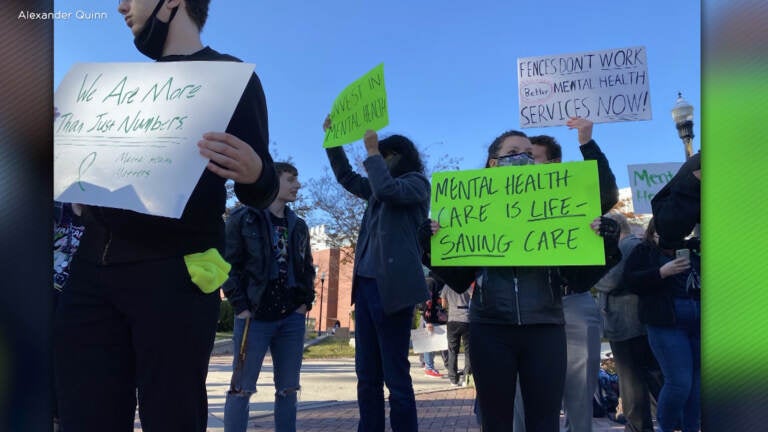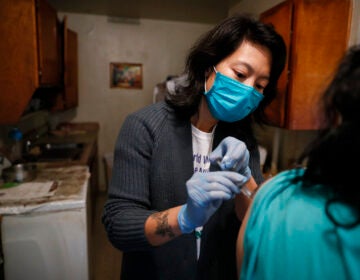N.J. budgets $480.5M to bolster mental health services
Funds are earmarked for children’s programs, suicide prevention, training more mental health professionals, crisis hotline and more.

Students call for mental health funding at Rowan University. (Alexander McQuinn, via NJ Spotlight)
This story originally appeared on NJ Spotlight.
Lawmakers attempting to address the need for mental health services statewide directed money to children’s programs, schools, the opioid epidemic, suicide prevention, a new crisis hotline, an expanded program for mental health professionals and more as part of the $50.6 billion budget signed last week by Gov. Phil Murphy.
The push for more funding and better distribution of mental health resources comes as New Jerseyans continue to seek mental health services to address the emotional tolls of an ongoing pandemic while grappling with the need for more therapists statewide.
A fact sheet from the National Alliance on Mental Illness based on data from February 2021 said that 1.11 million New Jersey adults have a mental health condition. That’s over three times the population of Newark, the state’s largest city. Additionally, 42.2% of adults in the state reported symptoms of anxiety and depression. Of this group, 19.9% were unable to get the counseling or therapy they needed.
“Now more than ever, our kids need better access to mental health services and a strengthened support system,” said Assemblywoman Sadaf F. Jaffer (D-Somerset). “Proper funding for these services is vital to child development and wellbeing. The funding in the 2023 budget will give more children in New Jersey the ability to receive mental health services and ultimately get the help they need. This will make a substantial difference in many people’s lives.”
Here are highlights of key funding for mental health services in the new state budget:
Funding for more mental health professionals
State lawmakers plan to distribute a total of $480.5 million as grants-in-aid money to the Division of Mental Health and Addiction Services within the Department of Human Services. Grants-in-aid refers to money given out by the state to fund a program or project that does not need to be paid back because it’s not a loan.
Of this amount, $5.62 million will be disbursed to a fund dedicated to adding more mental health professionals statewide. The National Alliance on Mental Illness fact sheet says that 39,712 people in New Jersey live in communities that do not have enough mental health professionals.
The $5.62 million includes $4 million to fund 10 new medical residencies, $800,000 to add four new psychiatry fellowships to address the needs of children and adolescents and $100,000 for outreach to promote new residency positions in the state, especially among medical students who are underrepresented in the field.
Mental health for all ages
Cooper University Healthcare system will receive $3 million for pediatric mental health services, while the Department of Children and Families will get $12 million for a pilot program on collaborative mental health for children. The Legislature assigned $2.4 million to a similar program in 2015.
College campuses will also see money coming their way for mental health awareness and suicide prevention. The Rabbinical College of America in Morristown will receive a maximum of $250,000 for mental health training and workshops to promote mental health awareness. At Seton Hall University in South Orange, the Great Minds Dare to Care initiative, a program that fosters a collaborative approach to suicide prevention on campus, will also receive a maximum of $250,000. The health department will also receive $240,000 for improving mental health for older Black residents throughout the state.
Crisis hotline, opioid recovery and more
The Department of Human Services will get $16 million for the rollout of the 988 mental health crisis and suicide prevention hotline. The hotline number is scheduled to be put in place nationwide on July 16.
Another $2 million will go to fund two county-based pilot programs to serve people who are in the criminal justice system with mental health conditions. A portion of this money will go to the Mental Health Association of Essex and Morris, Inc. to create a pilot program in Morris County. The rest of the money will be given to a county-based pilot program that will be selected through a competitive process.
Finally, the Department of Human Services will also receive $3.25 million to expand the opioid recovery pilot program.
Editor’s note: The state budget appropriates $1 million to Public Media of New Jersey, a division of the WNET Group that oversees NJ Spotlight News.
WHYY is your source for fact-based, in-depth journalism and information. As a nonprofit organization, we rely on financial support from readers like you. Please give today.







